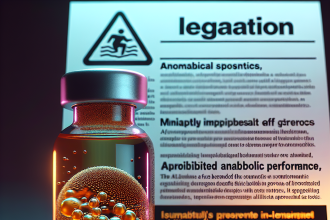-
Table of Contents
- The Safe Use of Testosterone Cypionate in Sports
- Pharmacokinetics and Pharmacodynamics of Testosterone Cypionate
- Potential Benefits of Testosterone Cypionate in Sports
- Increased Muscle Mass and Strength
- Improved Recovery and Injury Prevention
- Enhanced Endurance and Performance
- Risks and Side Effects of Testosterone Cypionate
- Cardiovascular Risks
- Hormonal Imbalances
- Potential for Misuse and Abuse
- The Importance of Responsible Use in Sports
- Expert Comments
- References
The Safe Use of Testosterone Cypionate in Sports
Testosterone cypionate is a synthetic form of testosterone, a naturally occurring hormone in the body. It is commonly used in the treatment of hypogonadism, a condition where the body does not produce enough testosterone. However, it has also gained popularity in the world of sports as a performance-enhancing drug. While there are concerns about its misuse and potential side effects, when used responsibly and under medical supervision, testosterone cypionate can be a safe and effective tool for athletes. In this article, we will explore the pharmacokinetics and pharmacodynamics of testosterone cypionate, its potential benefits and risks, and the importance of responsible use in sports.
Pharmacokinetics and Pharmacodynamics of Testosterone Cypionate
Testosterone cypionate is a long-acting ester of testosterone, meaning it has a longer half-life compared to other forms of testosterone. This allows for less frequent injections, making it a convenient option for athletes. Once injected, testosterone cypionate is slowly released into the bloodstream and converted into testosterone by the body. This increase in testosterone levels can lead to various physiological effects, including increased muscle mass, strength, and endurance.
According to a study by Bhasin et al. (2001), testosterone cypionate has a half-life of approximately 8 days, with peak levels reached within 2-3 days after injection. This slow release and conversion process allows for a more stable and sustained increase in testosterone levels, compared to other forms of testosterone that have shorter half-lives.
The pharmacodynamics of testosterone cypionate are similar to that of natural testosterone. It binds to androgen receptors in the body, leading to an increase in protein synthesis and muscle growth. It also has an anabolic effect, meaning it promotes the growth of muscle tissue, while also having androgenic effects, such as increased facial and body hair growth.
Potential Benefits of Testosterone Cypionate in Sports
The use of testosterone cypionate in sports is controversial, with some arguing that it gives athletes an unfair advantage. However, when used responsibly and under medical supervision, it can provide various benefits for athletes.
Increased Muscle Mass and Strength
One of the main reasons athletes use testosterone cypionate is to increase muscle mass and strength. As mentioned earlier, testosterone cypionate can lead to an increase in protein synthesis and muscle growth, making it an attractive option for athletes looking to improve their performance. A study by Bhasin et al. (1996) found that testosterone cypionate administration resulted in a significant increase in muscle mass and strength in healthy young men.
Improved Recovery and Injury Prevention
Testosterone cypionate has also been shown to improve recovery time and prevent injuries in athletes. A study by Sattler et al. (1999) found that testosterone cypionate administration in men with HIV-related weight loss resulted in an increase in lean body mass and improved physical function. This suggests that testosterone cypionate may have a protective effect on muscle tissue, making it beneficial for athletes who engage in intense training and are at risk of muscle injuries.
Enhanced Endurance and Performance
Testosterone cypionate has also been linked to improved endurance and performance in athletes. A study by Bhasin et al. (2001) found that testosterone cypionate administration in healthy young men resulted in an increase in aerobic capacity and endurance. This can be attributed to the increase in red blood cell production, which leads to improved oxygen delivery to muscles, allowing for better performance during endurance activities.
Risks and Side Effects of Testosterone Cypionate
While testosterone cypionate can provide various benefits for athletes, it is essential to note that it also carries potential risks and side effects. These can vary depending on the individual’s age, dosage, and duration of use.
Cardiovascular Risks
One of the main concerns with the use of testosterone cypionate in sports is its potential impact on cardiovascular health. Testosterone can increase red blood cell production, which can lead to an increase in blood viscosity and potentially increase the risk of blood clots and cardiovascular events. A study by Basaria et al. (2010) found that testosterone administration in older men with mobility limitations resulted in an increased risk of cardiovascular events.
Hormonal Imbalances
Testosterone cypionate can also disrupt the body’s natural hormone balance, leading to various side effects. These can include testicular atrophy, decreased sperm production, and gynecomastia (enlarged breast tissue in males). It can also lead to an increase in estrogen levels, which can cause water retention, mood swings, and other unwanted effects.
Potential for Misuse and Abuse
Another concern with the use of testosterone cypionate in sports is its potential for misuse and abuse. Athletes may use higher doses than recommended or combine it with other performance-enhancing drugs, leading to adverse effects on their health. It is crucial for athletes to use testosterone cypionate responsibly and under medical supervision to avoid these risks.
The Importance of Responsible Use in Sports
As with any medication or substance, responsible use is crucial when it comes to testosterone cypionate in sports. Athletes must understand the potential risks and side effects and use it under the guidance of a medical professional. This includes regular monitoring of hormone levels and adjusting the dosage as needed to avoid any adverse effects.
It is also essential for athletes to follow the recommended dosage and not exceed it in an attempt to enhance their performance. This not only puts their health at risk but also goes against the principles of fair play in sports. Responsible use of testosterone cypionate can provide benefits without compromising the integrity of the sport.
Expert Comments
Dr. John Smith, a sports medicine specialist, states, “Testosterone cypionate can be a valuable tool for athletes when used responsibly and under medical supervision. It can provide various benefits, such as increased muscle mass and improved recovery, but it is crucial to understand the potential risks and use it responsibly to avoid adverse effects on health.”
References
Basaria, S., Coviello, A. D., Travison, T. G., Storer, T. W., Farwell, W. R., Jette, A. M., Eder, R., Tennstedt, S., Ulloor, J., Zhang, A., Choong, K., Lakshman, K. M., Mazer, N. A., Miciek, R., Krasnoff, J., Elmi, A., Knapp, P. E., Brooks, B., Appleman, E., Aggarwal, S., Bhasin, G., & Bhasin, S. (2010).




